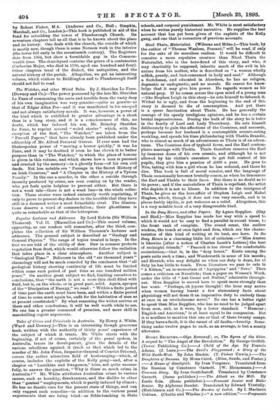Nieol Thain, Materia/isf. Millions and Milne.)—This book, by the author
of "Thomas Wanless, Peasant," will be read, if only for the sake of its merciless realism. It would be difficult to conceive a more repulsive creature than Nicol Thain the Materialist, who is the hero-fiend of this story, and who, it may charitably be supposed, inherits much of the evil in his nature from his mother, who is described as "a woman wholly selfish, greedy, and lust-consumed in body and soul." Although a Scotchman, and educated in Aberdeen, he has no religion, dogmatic or undogmatic, and no morals. He craves for know- ledge that it may give him power. He regards women as his natural prey. If he comes across the open mind of a young man —like Stephen Leigh in this story—he sets himself to debauch it. Withal he is ugly, and from the beginning to the end of this story is doomed to die of consumption. And yet there is a queer fascination about Thain. He has generally the courage of his openly irreligious opinions, and he has a certain brutal impressiveness. During the bulk of the story he is tutor in the family of Lord and Lady Thornbury. He sets himself deliberately to gain the affections of the Countess, and succeeds, perhaps because her husband is a contemptible arsenic-eating weakling, and spends his time philandering with Thekla Brandis, who is almost as much of an adventuress as Thain is of an adven- turer. The Countess dies of typhoid fever, and the Earl contem- plates marriage with Thekla. Thain therefore removes the Earl by immense doses of his own arsenic, and although he is not allowed by his victim's executors to get full control of his pupils, they give him a pension of .£400 a year. He goes to Nice, taking with him a girl whom he has seduced, and there he dies. This book is full of moral squalor, and the language of Thain occasionally becomes brutally coarse, as when he denounces the Earl and Thekla to their faces. But there is no doubt as to. its power; and if the materialism of Thain is repellent, the artist who depicts it is not to blame. In addition to the intrigues of Thain, he gives us the love-affair of Stephen Leigh and Mabel Hughes, which, though it does not run very smooth, and is in places feebly idyllic, is yet welcome as a relief. Altogether, this is a very notable book of a very disagreeable kind.






































 Previous page
Previous page